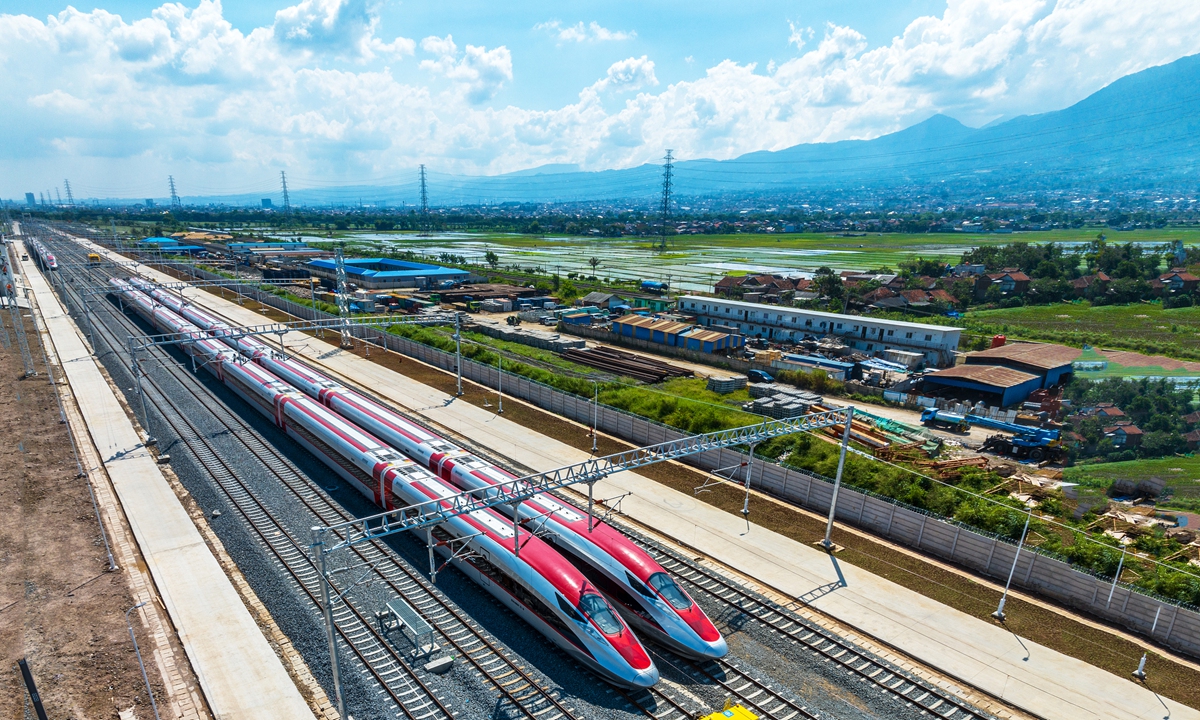
Photo: CFP
Ahead of the 3rd Belt and Road Forum for International Cooperation (BRF) to be held later this year in China, some foreign media have been consistently badmouthing the Belt and Road Initiative (BRI), claiming that certain leaders of developed countries will not attend the forum, before detailed information about the event is released.
A source familiar with the event preparation told the Global Times on Friday that the vast majority of invitations of the upcoming forum are extended to those of developing countries, while some of developed countries will not be included. "Whether it's the invitation of leaders or related cooperative arrangements, China is pursuing not scale and quantity, but quality and effectiveness," the source said.
According to the source, the core purpose of the forum is to collaborate on development, the source said, with the majority of participants of the BRI being emerging economies. Consequently, invited leaders will come mostly from developing countries.
Information revealed by the source also comes as a response to some Western media reports, which claimed that foreign officials agreeing to attend the BRF are currently "fewer than expected." The reports also suggested that Europe is "avoiding" participation in this forum, with European leaders such as French President Emmanuel Macron, German Chancellor Olaf Scholz, and Italian Prime Minister Giorgia Meloni reportedly not having plans to attend the forum.
The source said China has not extended invitations to some of the Western leaders as mentioned in the reports, and the speculation of "avoiding participation" is simply not valid in the absence of such invitations.
In fact, many countries proactively reached out to China to express strong willingness to be invited to attend the forum upon learning that the third BRF will be held this year.
A recent report from the European think tank, the Bruegel Institute, indicated that over the past decade, the Belt and Road Initiative has successfully withstood numerous challenges and tests, earning widespread acclaim on a global scale. Developing countries, in particular, hold steadfast sentiments toward the initiative.
China is currently in the process of carefully considering the invitation list for the summit forum. "It will not be held only this three times; some leaders may participate in this year's forum, while others may attend the next. China hopes that leaders of participating countries will have ample opportunities for meaningful expression and in-depth communication, and will receive thoughtful arrangements," the source stressed.
As an initiative that has garnered participation from over three-quarters of the world's nations and numerous international organizations, the Belt and Road Initiative has received widespread acclaim from the international community, particularly from developing countries.
"The doors of the BRF are open to all nations, regions, institutions, business communities, and international organizations that are genuinely committed to regional and global connectivity, international economic cooperation, shared development among developing countries, and the United Nations' 2030 Agenda for Sustainable Development," the source told the Global Times.
While China currently has no plans to invite the leaders of developed countries mentioned in the reports, other personnel from these countries who wish to participate in activities within the framework of the forum are welcomed by China," the source added. "If they choose not to attend, that's OK too. Certain Western media need not overestimate their importance; the success of the summit forum is not determined by the number of developed countries in attendance."
This year marks the 10th anniversary of the Belt and Road Initiative. Song Wei, a professor from the School of International Relations at Beijing Foreign Studies University, told the Global Times that at this significant juncture, China will leverage the opportunity presented by the summit forum to work collectively with relevant parties and achieve more fruitful outcomes for the Belt and Road Initiative. This effort aims to inject new impetus into global economic recovery and sustainable development.
Over the past decade, China has collaborated closely with various parties to jointly build the Belt and Road, transforming blueprints into reality and translating them into tangible outcomes and benefits for people across nations. Data reveal that over the course of a decade, the Belt and Road Initiative has spurred investment of nearly a trillion US dollars, resulting in the formation of over 3,000 cooperative projects and generating 420,000 job opportunities for countries along the route, thereby lifting nearly 40 million people out of poverty.
The report from the Bruegel Institute said that in recent years, China has provided tangible benefits to countries along the Belt and Road through trade and investment channels. The initiative has also played a complementary role in development assistance alongside institutions like the World Bank and the Asian Development Bank, creating new development opportunities for these countries.
Song added that the Belt and Road Initiative is widely recognized by the international community as a high-quality public good initiated by China, jointly built by all parties, and shared by the world, while adhering to the principles of extensive consultation, joint efforts, and shared benefits, which is the key to why it has been broadly recognized by the world.
"Throughout the process, China has never imposed its own ideas on others, nor has it mixed geopolitical agendas. As an open and inclusive international cooperation platform, the Belt and Road Initiative promotes a more inclusive, beneficial, and balanced form of global development, as opposed to a globalization that serves only a few countries. Facts have proven that any attempts to smear the Belt and Road Initiative and the collaborative efforts between China and partner countries will ultimately debunk themselves," Song said.




